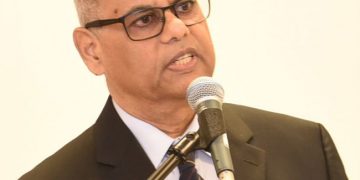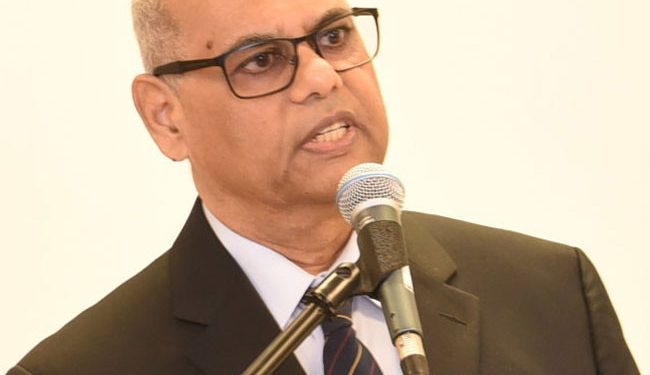Dear Editor,
I write regarding Freddie Kissoon’s article “Oil and Guyana’s future” (Kaieteur News, July 08, 2022). I agree with his view that the EXXON-Guyana oil contract “could have been better for Guyana in comparison to other oil explorations around the world”. Also, I agree with his assertion that to argue that “(1) because of an ill-shaped contract, Guyana should halt oil operations and (2) because of climate change, Guyana should get out of the fossil fuel business is not only unconscionable but plainly unacceptable”.
He writes “The (oil) industry is going to be around for another 50 years. In that interregnum, countries incredibly rich and billions of miles ahead of Guyana will sell oil within those 50 years”. The policy of two leading oil producing nations supports this view. In explaining his commitment to the oil industry in Canada, in a speech in Texas, USA, in March 2017, Canadian Prime Minister Mr Justin Trudeau stated ( Maclean’s magazine, March 10, 2017) “No country would find 173 billion barrels of oil in the ground and just leave them there”. Also, Reuters of April 15, 2022, reports “The Biden (US President) administration on Friday said it has resumed plans for oil and gas development on federal lands”.
An editorial in the Los Angeles Times of September 15, 2019 is relevant. It notes “the richest, most developed countries in the world are overwhelmingly to blame for the catastrophe of global climate change… For more than a century, the largest emitters of greenhouse gases, in total as well as per capita, have been the big developed nations, most notably the United States and the countries of Europe, which grew their economies by burning fossil fuels and spewing carbon from their factories, homes and cars”. To date they still emit carbon and other greenhouse gasses disproportionately into the environment.
According to the editorial, effort to ameliorate climate change “must be led by the nations that reaped so many of the benefits of economic development and increased wealth through industrialization for so long”. Unfortunately the rich countries are not living up to their moral obligation or their financial commitment. In 2010 and then again in 2015 wealthier nations pledged to donate to the Green Climate Fund up to $100 billion per year by 2020. The fund was created under the auspices of the United Nations to help developing countries reduce the emissions that lead to climate change. However in 2018, Oxfam’s senior climate change policy advisor called the money moving from rich countries to the least developed ‘sadly inadequate’. The editorial called it “shameful”.
In his article Mr Kissoon asks “Why a small poor country should bear the burden of cleaning the world’s ecological system by removing its fossil fuel industry when there is no replacement for the lost income?”. This is a pertinent question that critics of the Government, at home and abroad in the rich countries, have not answered. In addition, it should be pointed out that the green-house gases spewed by the rich countries do not remain within their borders. Their green-house gases travel far and wide, polluting the entire planet. For centuries Guyana’s rainforest, together with those in the other poverty-ridden tropical countries, has been the purifier of the planet without any compensation. Yet, when poor countries extend their begging bowls to the rich countries, they receive less than pittance to help their citizens while billions of dollars are available, on the spur of a moment, to fund war efforts. Even at its maximum level of oil production, it is likely that Guyana’s rainforest will be able to absorb more than its fair share of green-house gases.
Regarding renegotiating the oil contract, this may not be realistic. Former President Mr Bharat Jagdeo’s promise, while in opposition, to renegotiate the oil contract was perhaps opportunistic. It may have been an election promise similar to that of former President Mr David Granger when he was in opposition and had promised constitution reform but which was never acted upon when he was in government. Current President Dr Ali’s statement that “negotiating with ExxonMobil is like negotiating with a superpower” is more realistic and acknowledges the difficulties. In assessing its position the Ali Government likely considered (1) the message that will be sent to new investors that are being courted; (2) the likelihood of exorbitant cost of a court challenge and the possibility of losing; (3) likely pressure from EXXON’s home government, i.e. the US, in any attempt to renegotiate an existing contract. Not only that US support may be needed in defence of Guyana’s territorial integrity, but powerful home governments are known to vigorously protect their nationals and commercial interests abroad. The history of many countries in Central and South America can attest to this.
I support all efforts for transparency in Government’s decision making and initiatives to improve Government’s accountability in the oil industry. Also, all Guyanese must be the beneficiaries of the oil wealth which must not be used for the enrichment of a few who are in-charge or well connected. And prudent action is necessary to maintain a reasonable balance between economic development and protection of the environment. However, this valuable resource must be exploited while time allows to eliminate poverty and improve the lives of all Guyanese.
Harry Hergash



































































